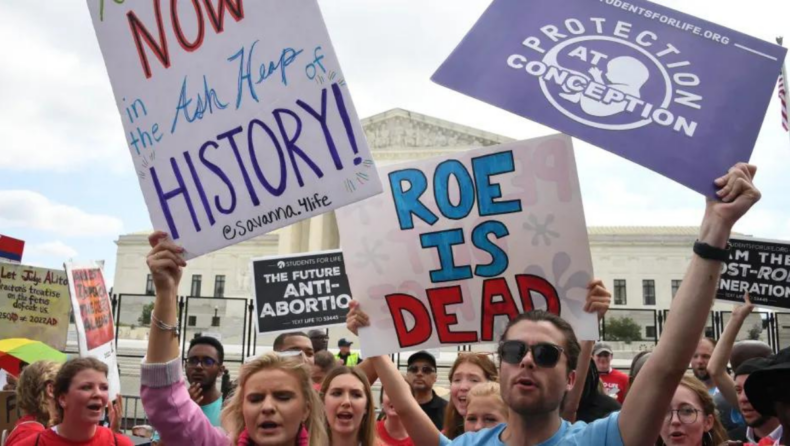After the Supreme Court overturned its 50-year-old Roe v Wade decision, millions of women in the United States will lose their constitutional right to abortion.
. The decision opens the door for individual states to prohibit the procedure.
. Half of them are expected to impose new restrictions or bans. Thirteen states have already approved so-called trigger laws that make abortion illegal by default.
. President Joe Biden called it a “tragic error” and encouraged states to pass legislation allowing the procedure.
. According to research from Planned Parenthood, a healthcare organisation that provides abortions, abortion access is expected to be cut off for approximately 36 million women of reproductive age following the Supreme Court ruling.
. As her supporters applauded the decision, one anti-abortion activist said she was “elated.” “Making this the law of the country isn’t enough. Being pro-life means making [abortion] unthinkable “She stated.
. Pro-choice advocates on both sides of the aisle condemned the judgement as “illegitimate” and even “fascist.”
Samantha Granville of the BBC reported from an abortion clinic in Little Rock, Arkansas, that as soon as the decision was posted, the doors to the patient area were closed and the echo of distanced sniffling could be heard before she was asked to leave. The state is another one of those affected by the grave law.
The Supreme Court ruled by a vote of seven to two in the landmark Roe v Wade case in 1973 that a woman’s right to abortion was secured by the US constitution.
The ruling guaranteed American women the right to an abortion during the first 3 months of pregnancy but permitted prohibitions in the second trimester and prohibitions in the third.
However, anti-abortion rulings have significantly lowered direct exposure in more than a dozen states in the decades since.
The Supreme Court was currently hearing Dobbs v Jackson Women’s Health Organization, a case that challenged Mississippi’s 15-week abortion ban.
The conservative-majority court officially ended the human right to abortion by ruling in favour of the state.
Five justices strongly supported the nomination: Samuel Alito, Clarence Thomas, Neil Gorsuch, Brett Kavanaugh, and Amy Coney Barrett.
In a separate opinion, Chief Justice John Roberts stated that, while he backed the Mississippi ban, he might not have gone any further.
Stephen Breyer, Sonia Sotomayor, and Elena Kagan, the three justices who voted against the majority, wrote that they did so “with sorrow – for this court, but more so for the numerous millions of American women who have presently lost a basic constitutional protections.”
Friday’s decision represents an outright shift of the Supreme Court’s court precedent – a relatively rare move – and is likely to spark opposition that divides the country.
In states where public opinion on abortion is divided, such as Pennsylvania, Michigan, and Wisconsin, the procedure’s legality could be decided on an election-by-election basis. In others, the ruling could spark a new round of legal battles, such as whether people can travel out of state for abortions or arrange the necessary medicines for abortion by using mail services.
President Biden criticised the Supreme Court ruling, telling women in states where it would be illegal to travel to states where it was not.
Several Democratic governors, including those of California, New Mexico, and Michigan, already have announced their plan to include abortion rights in their state constitutions.
Mississippi Governor Tate Reeves immediately accepted the court’s decision, and said his state had “led the country to resolve one of the biggest injustices in our country’s history.”
“This choice will lead to more hearts beating, strollers being pushed, report cards being issued, little league games being played, and lives being lived. It’s a happy day!” he had written.
Former Vice President Mike Pence, a long-time opponent of Roe v Wade, implored supporters not to give up till “the sanctity of life” was legally protected in every state.
On the other side of the aisle, Democratic House Speaker Nancy Pelosi declared that “the Republican-controlled Supreme Court” had accomplished the party’s “dark and extreme goal.”
She wrote, “American women today have less freedom than their mothers.” “This heinous ruling is both outrageous and heartbreaking.”
The overturning of a lengthy precedent has also raised concerns about other rights upheld by the Supreme Court in the olden days.
In his opinion, Justice Clarence Thomas stated, “In future cases, we must reevaluate all of this Court’s substantive due process precedents, including Griswold, Lawrence, and Obergefell,” referring to three landmark decisions on the right to contraception, the revoke of anti-sodomy laws, and the legalisation of same-sex marriage.













